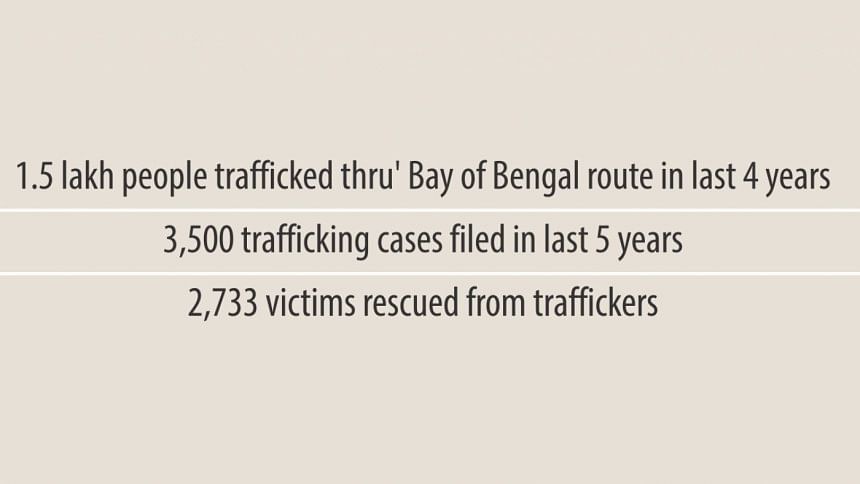Human Trafficking from Bangladesh: Kingpins remain unpunished

In the last five years, as many as 2,733 people have been rescued from the clutches of human traffickers in Cox's Bazar. And 242 cases were filed against some 1,355 people over the incidents.
However, not a single one has been disposed of.
Ninety-two of the cases are now under trial amid a backlog at a special tribunal, which mainly deals with women and children repression prevention cases, in the coastal district.
The country passed an anti-trafficking law in 2012 with a provision for a tribunal that will exclusively handle trafficking cases. However, the tribunal has not been set up yet.
Talking to The Daily Star yesterday, Taposh Raxit, special public prosecutor at the tribunal in Cox's Bazar, said what is more frustrating is that plaintiffs hardly appear before the tribunal to come up with their accounts in connection with the 92 cases. So, it is difficult to expect early disposal of any of those, he said.
With governments, non-government organisations and right bodies across the globe observing the “World Day against Trafficking in Persons” today, experts in Bangladesh have emphasised bringing the kingpins of the crime to book.
Many believe a very poor rate of conviction in trafficking cases could be a reason why the menace continues unabated.
Some 3,500 cases have been filed across the country after the formulation of Prevention and Suppression of Human Trafficking Act, 2012. However, only 30 criminals have been convicted so far.
According to the “Global Report on Trafficking in Persons, 2016” prepared by the United Nations Office on Drugs and Crime, Bangladesh reported just 10 to 15 convictions a year in human trafficking cases. It was way below the conviction rate (50 to 80) in its neighbour Nepal, the report said.
Such a slow pace of trial keeps frustrating the victims as the Bay of Bengal continues to be a hotspot of human trafficking over the years.
About 1.5 lakh people were trafficked out through this route alone in the last four years. Around 1,500 of them died before they could reach their destinations.
In May 2015, bodies of over 200 trafficking victims were dug out from mass graves in the deep jungles of Malaysia and Thailand. Many of them were Bangladeshis, according to a report of the United Nations High Commissioner for Refugees.
European Union agency Frontex says Bangladesh is now among the top countries of origin for illegal immigrants in Europe with their number hitting 7,899 in the first six months of this year.
An EU delegation during their Dhaka visit in April claimed that around 80,000 illegal Bangladeshi migrants were staying in Europe.
Meanwhile, speaking at a consultation meeting at the city's Brac Centre Inn yesterday, National Human Rights Commission Bangladesh Chairman Kazi Reazul Hoque suggested that the government short-list the top 25 trafficking “godfathers” in the country for their immediate arrests.
Human trafficking is a heinous crime and “extreme form of human rights violation”. But the government is not doing much to curb it, he said.
It has to overlook powerful and political links and make a list of the top criminals immediately, he added.
Brac organised the event, titled “Situation Analysis of Human Trafficking and Irregular Migration”, to mark today's 'World Day against Trafficking in Persons'. It was chaired by the organisation's Senior Director Asif Saleh.
Addressing the government, migration expert Prof CR Abrar said, “You don't have to try 1,200 or 200 people. Just find out five big fish and punish them.”
He said awarding adequate punishment to those big fish would set an example and help control human trafficking in the country.
Officials working to fight the global menace often cite an example of Thailand where a court sentenced an army general for his active role in the crime. They feel the need for a firm commitment on the part of Bangladesh government to punish the culprits.
After remaining stagnant at “Tier 2” in the US Trafficking in Persons reports for the last five years, Bangladesh has recently slid to “Tier 2 Watch List”, due to poor investigation and prosecution in the country.
Attending the event at the Brac Centre Inn, experts also said the government should handle the issue with a stronger hand for unmasking the trafficking kingpins, who remain out of the reach of the law.
Referring to police statistics, Brac Migration Programme head Shariful Hasan said about 3,500 cases have been filed over human trafficking since 2012.
Jabed Ahmed, additional secretary of Ministry of Expatriates Welfare and Overseas Employment, claimed that the government has taken many initiatives to tackle the crime. He, however, stressed the need for more co-ordination between different ministries in this regard.
Md Shah Alam, additional deputy inspector general (economic crime) of the Criminal Investigation Department, and Asif Saleh, senior director, strategy, communication and empowerment of Brac, among others, spoke at the programme.
(Our Cox's Bazar Correspondent Muhammad Ali Jinnat contributed to this report)


 For all latest news, follow The Daily Star's Google News channel.
For all latest news, follow The Daily Star's Google News channel. 








Comments